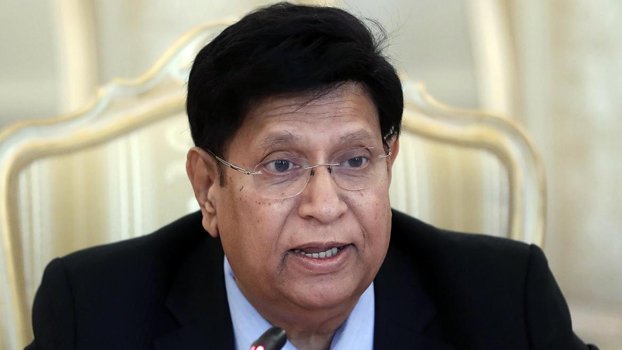Bangabandhu’s Sonar Bangla was not an ‘aspirational utopia’

Foreign Minister Dr AK Abdul Momen on Sunday said that Bangabandhu’s vision of a ‘Sonar Bangla’ was not just an “aspirational utopia” that he borrowed from Rabindranath Tagore in a display of his admiration for the bard and thinker, he said.
“What is however remarkable is that this notion of ‘Sonar Bangla’ was not derived from the thoughts of eminent political economists since the European enlightenment, but instead got crystallised through Bangabandhu’s own life-long political struggles and close interactions with the people across the land,” he said.
“In the process, an idea of a service-oriented, inclusive and egalitarian state system emerged in his mindscape with a distinctly local cultural and environmental flavour. That is perhaps why the idea struck a chord with the masses in the quasi-colonial political and economic reality of East Pakistan, and helped mobilized people from all walks of life to take up arms to bring their freedom struggle to its logical conclusion through independence,” he said.
He was delivering a speech at the Mujib Barsha lecture session on “Bangabandhu’s Concept of Sonar Bangla, Swedish Model of Welfare State and Tackling the Global Challenges of Tomorrow” on Sunday at the Foreign Service Academy.
Visiting Swedish Minister for International Development Per Olsson Fridh presented the keynote paper.
This particular month of March marks a confluence of three major events in our national context: the high point of the birth centenary celebration of our Father of the Nation Bangabandhu Sheikh Mujibur Rahman, the golden jubilee of our independence and the conclusive decision by the UN for Bangladesh’s eventual graduation from the Least Developed Country (LDC) status.
“This is the juncture where we must contemplate what our founding father had envisaged for an independent Bangladesh and how far have we moved along his desired direction as a nation,” he said
“Bangabandhu instilled dynamism amongst his people by saying, “We can rebuild the country through hard work. Let us work together so that Sonar Bangla shines again.”
“It was Bangabandhu who waived the debts of one million farmers, ensured seed and agricultural equipment supply at concessional rates, and introduced fair prices and rations for farmers. Despite having to nationalize the abandoned industries, it was Bangabandhu who had lifted the limit of private investments and favoured deregulation by handing over some factories in private ownership.
“It was also during Bangabandhu’s time in office that the non-government organisations (NGOs) started their operations in the country, mostly in order to fill the spaces left behind by international organisations following the relief efforts in the immediate aftermath of the War of Liberation in 1971,” he said.
In view of the recurrent insurrection activities by certain disruptive forces, endemic corruption and black marketing, Bangabandhu made a clarion call for a ‘Second Revolution’ to further stabilize a post-conflict nation that could potentially drift apart in a severely resource-constrained setting.
The brutal assassination of Bangabandhu brought this project to a halt, leading to much misinformation and misunderstanding about its constituent elements that did not even have a chance to get materialized, said the foreign minister.
Bangladesh, Sweden ‘common interest’
The Foreign Minister said that Bangladesh and Sweden have a “common interest” in working together to advance human rights, sound human mobility and human connectivity.
“We underscore our interest in further diversifying our traditional development cooperation through enhanced trade, investment and knowledge partnership,” he said.
“We should commence working on at least one pilot initiative to jointly carry out research on technological or environmental solutions that can be beneficial for our peoples at the grassroots.”
He said the Swedish welfare system has indeed been a matter of lively debate and reflection in the international political and economic discourses for quite some time.
The sense of idealism surrounding the system is reinforced by Sweden’s top rankings in most global welfare indexes, including in the UN Human Development Report.
Despite its detractors, the Welfare State System has so far proved to be sustainable deriving strength from a portfolio of policy options that the Swedish Minister just recounted, he said.
“The resilience also appears to have been due, to no small measure, the continuity of a political system and orientation over the years and to a growing reliance on adaptability in the public sector.
“It has certainly been useful to hear from Minister Fridh how the system has evolved through the years and has been calibrated to respond to the emerging national and global challenges.
“Our interest in delving deeper into this system at this stage is not purely coincidental,” he said.



